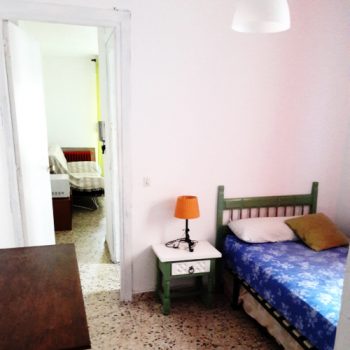
Adapting to a New Culture: What You Should Know
Dear Emily,
Just thinking about this topic of adaptation, so many different things come to mind, but most of them are not what most people think. Why? Because most people expect adaptation to take a couple of months, something that is quick and relatively painless if you manage to find somewhere that fits you well. Here at Sincerely, Spain, we even talk about the phases of culture shock in this post and make it sound like it is something that is relatively easy to get over. Today, however, we want to discuss how adaptation is not something that necessarily happens in a short period of time but that is something that, most likely, will happen over years of living in a place.
 In addition, we would like to recognize that every time you move abroad you are going to have a different experience. This might seem obvious if you think about it from an outside perspective but we have to admit that we have also fallen into the trap of expecting different places to be alike. This becomes exceptionally frustrating when you find you do not know how to deal with the different circumstances and feelings that come along with the new place.
In addition, we would like to recognize that every time you move abroad you are going to have a different experience. This might seem obvious if you think about it from an outside perspective but we have to admit that we have also fallen into the trap of expecting different places to be alike. This becomes exceptionally frustrating when you find you do not know how to deal with the different circumstances and feelings that come along with the new place.
If you have worried about adapting to a new country or are facing internal emotional conflicts about where you are currently living, we want you to keep in mind, firstly, that you are not alone. In addition, we would ask you to consider the following questions:
Where are you coming from?
From a country and city perspective, but also from the perspective of your emotional state, how did you leave your last home? This is a really important question to ask yourself because where we come from determines our expectations. Maybe you are a person who has taken an amazing job opportunity abroad in Madrid but don’t speak Spanish and are finding everyday tasks like going to the store to be frustrating. Or maybe you are a person who studied abroad in Madrid and fell in love with the city and came back to be a part of the auxiliares de conversación y cultura program but don’t really like the work.
 Both of these situations are frustrating, but they are frustrating in different ways. In the first scenario, you may have no reason to stay in Spain and try to integrate into this new country. Most likely, you will decide to go back home or try somewhere new. In the second scenario, you are probably more likely to be motivated to find a new job or other ways to compensate for the not-so-great experience of teaching. This is just the surface of your adaptation process, but it does impact your overall experience and perception of the place you are living. In turn, this will impact the effort you make to adapt to the new country which will also affect your overall adaptation process.
Both of these situations are frustrating, but they are frustrating in different ways. In the first scenario, you may have no reason to stay in Spain and try to integrate into this new country. Most likely, you will decide to go back home or try somewhere new. In the second scenario, you are probably more likely to be motivated to find a new job or other ways to compensate for the not-so-great experience of teaching. This is just the surface of your adaptation process, but it does impact your overall experience and perception of the place you are living. In turn, this will impact the effort you make to adapt to the new country which will also affect your overall adaptation process.
What are your previous experiences?
Like we said before, no two experiences will be the same but if you have some experience, that will most likely help you in your new home. This is because if you have already had to adapt to a new place, make friends, and find your place in the community, you will have some expectation that it is not as simple as it might seem. Of course, the tips and tricks you picked up in one place might not work in another but you will have a better idea that you have to work on this process.
On the other hand, if you have no previous experience with moving to a new place, you will probably find that everything feels quite difficult. When it is your first move abroad, it is easy to think that it is too different to go abroad and that it is much easier just to stay home (which we won’t necessarily argue with, but we wouldn’t choose that option for ourselves either). However, make sure you empathize with yourself and take things slowly.
Check out: This article on dealing with uncertain times for our favorite tips when you need to take care of yourself.
 How are you becoming part of the community?
How are you becoming part of the community?
This might get some push back from people who disagree but we would argue that for a true living abroad experience, you probably want to live somewhere for at least six months. Of course, that does not mean that you will not have incredible experiences if you stay somewhere for less time but most long-term expats will tell you that things change the longer you stay. This is probably, in part, because you integrate more into the local community.
How you integrate into a community has its own set of questions:
Where you are living?: This has to do with the country you are living in, but also the place within the country. It may seem strange to think about, but if you live abroad in a variety of places, there will be some that automatically feel more like “home” to you than others. This is because you will connect, somehow, to the way of life and the values of the people there. Sometimes we can describe these feelings but, and we would say more often, we just know in our gut when somewhere is a better fit.
However, you will probably also find that the type of place you are living also makes a big difference. Some people like to live in a bustling city where there is something to do every day where others prefer a quiet country-side town. In addition, if you are living outside the city and cannot really get to places to meet up with others, it will be harder to meet friends than if you live walking distance from most places. In general, if you are living in a country you really like but the atmosphere of the place doesn’t fit, it can make you think you don’t really like anything about where you are.
What you are doing there?: Are you living in a country that you are passionate about and want to interact with local people or are you just there for work? Are you making a long-term investment in the place or are you only passing through. Sometimes we end up places we are not really meant to be, and we think you can tell. In addition, the people from that place can tell if you don’t really like their country, and most people won’t find it attractive if you have lots of not so nice things to say about their home.
However, if you fall in love with the country and are very happy to live there, people are going to be more willing to go out of their way to connect with you. And, in our experience, the more people you interact with in a positive way, the more likely you are to meet people that fit what you are looking for in a new place. We are not saying that you should be fake or make friends with everyone, but you should be aware of how your actions impact your situation.
 Who you are interacting with?: In our opinion, living and interacting with locals can really make a big difference when it comes to feeling like part of the community. Sure, it is great to have friends that are like you, foreigners who maybe even come from the same country you do (read more about that in this post). However, if you don’t spend any time with people who are from the place you are living, you will find that you miss out on understanding life as the locals do.
Who you are interacting with?: In our opinion, living and interacting with locals can really make a big difference when it comes to feeling like part of the community. Sure, it is great to have friends that are like you, foreigners who maybe even come from the same country you do (read more about that in this post). However, if you don’t spend any time with people who are from the place you are living, you will find that you miss out on understanding life as the locals do.
A personal tip: If you are trying to connect with the locals, we would recommend sharing the curiosity or passion we mentioned above. People want to know you are interested in who they are and where they come from. They also want to know that you feel positively about your experience in their country, so, even if it is difficult for you, we would recommend trying to figure out some things you enjoy about the country and focus on the positive over the negative.
Despite the fact that you try to interaction with locals does not mean, of course, that you will necessarily like how the locals live their life or want to be like them. After all, we are all different and view the world in different ways. What this interaction does support you with is the ability to better understand how a country could be a fit for you and it gives you insight into how local everyday life works.
Most Importantly, Know it is an Ongoing Process
We’ve had the conversations many times that once you leave the country you grew up in to properly live abroad, you will find that you are always adapting. You will probably never fit 100% in the new place you are living but you will never really feel like you fit in back where you came from any more either (read our take on this here). This can feel extremely isolating but, at the same time, if you talk about it with other people, you can feel empowered that you are not alone.
In addition, there will be days when you are really happy with where you are, both in life and in the community you are living in. However, you will probably also find that you have days that are extremely frustrating and you don’t really feel like you fit in. On these days you are feeling a bit down, we would recommend checking your expectations with what you are doing to achieve them. It is easy to dream big, but if you are not taking actions to make those dreams a reality, there is only so much you can expect.
What is the hardest thing about adapting for you?
Sincerely,
Spain




